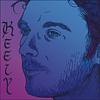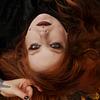Take a photo of a barcode or cover
The story begins when the town elders go to the Lord of Erl to ask that they be ruled by magic, the lord sends his only son, Alveric, to Elfland to bring back the King of Elfland's daughter. Alveric takes this challenge by going to the town witch Ziroonderel and has her make a magical lighting sword to take with him. There are a few comical scenes when Alveric barges in on the leather smith,an old man and his wife. Alveric ends up eating their supper and sleeping in their bed. Alveric makes his way east through the mists of Elfland where he cuts down with his magical sword all things in his way of getting to the princess of Elfland. The princess Lirazel ends up rescuing Alveric when her father tries to stop him and she helps him to escape to "the fields we know". They marry and have a son Orion. The books synopsis would have you believe that the magic was bad for Erl Tragically Alveric wants to change Lirazel and take the magic out of her. It's really sad because they really do love each other, but the religious human side of Alveric can't except the magical side of his wife and doesn't realize what he has until it's gone. Of course the story doesn't end there, so you'll need to pick up this book to find out how it ends. Written in 1924 this is precursor to all of the fantasies that have become so popular today, only it's written so beautifully that it's almost like poetry.
adventurous
inspiring
mysterious
reflective
relaxing
fast-paced
Plot or Character Driven:
A mix
Strong character development:
Complicated
Loveable characters:
Yes
This was a slow read, but a lovely one. I'm not sure what I was expecting but this exceeded anything I had in mind. Unfortunately the edition I had on kindle had no images so I'd like to get another copy, though even without the images the story painted lovely scenes. I highly recommend this one if you enjoy old, classic fantasy.
adventurous
dark
mysterious
medium-paced
In fantasy, I've seen magic used in many ways: as plot device, curio, religious allegory, and the personification of morals, but rarely do I find a book where magic is truly magical. Too often, it's a convenience, a cliche, but for Dunsany, magic is pervasive, mysterious, unknowable, and lovely. He captures a sense of the 'sublime': something so unbelievably beautiful that it becomes overwhelming, even frightening.
Dunsany wrote his stories with a handmade quill in a single draft. His language is a precise and delicate thing: a crystal skein from which he suspends his story. The descriptions are constantly turning and surprising, glinting with unexpected revelations, so that the whole of his world, from the most mundane to the fantastical teems with sorcerous possibility.
His magic does not delineate between the knowledge of farmers and that of wizards. Beneath the surface, it is known in varying ways to all, and each has the sense that at any unlooked-for moment, it might bubble up into their own lives, should they look too long at its mysteries. These things we cannot control and cannot understand might snatch us up in a wayward minute, and cast us adrift within a terrible beauty.
It is here we see the inspiration Lovecraft drew from Dunsany: the unfathomable world lurking just beneath our own, kept at bay only by intense mediocrity. For Lovecraft and Dunsany, it is the artist and musician who catch the true notes of the beyond and give mankind the gift of a more palatable version, like blue-eyed blues.
However, the danger of Dunsany's mysteries is not the deadliness of Lovecraft's, instead the great fear is that we should love something too much--that we should see something which from that moment, we can never shake free, but remain ever after haunted and seduced. Like Milton's Satan, the danger is not that evil should destroy us, but that we should come to understand its mind: to sympathize with a devil.
Dunsany's dances freely with heathenry--his magic is not Tolkien's Christian allegory, but mocks austerity and fears any death that would bring on the overwhelming awe of Heaven. There are some downright sacrilegious sentiments for those who fall in love with magic, gladly forsaking their humanity and their souls.
Yet magic is not opposed to religion, it is simply unconcerned with the small, somber moments of mankind. These are remote, incompatible worlds, not sides of a coin. The town priest says as much, warning the villagers that all things of Elfland are cursed in the eyes of God, they have never even had a possibility of salvation, for they were not made by God, and are unrelated to Him and his aims.
Yet religion is not the central theme here, nor does the book take it much more seriously than the galloping trolls. What is interesting because is how much it differs from most fantasy, where magic is the personification of one or another chivalric ideal, heathen ideals long since taken in by monotheism.
This isn't to say that the Dunsany doesn't in some ways praise chivalry. It is a Fairy Story, and though it gestures to some complexities of philosophy, its gender roles and class distinctions are often played straight. They are not harped on, but neither are they subverted.
There is also a ponderous quality to the language and actions which might make it difficult for some readers. This gentle lulling is central to the book's tone (and the magical themes in particular). The story is told neither from the perspective of mankind nor of Elfland, but some shifting point between.
This book is markedly different in its central concerns from either the Christian Epics that proceeded it or the Genre Fantasy that followed. The conflict between madness and tradition appears also in Peake's Titus books, the shifting pale is reminiscent of 'The Mists of Avalon', and the suffusing mist of magic across the world can be seen in 'Jonathan Strange and Mr. Norrell', but other than Lovecraft few have picked up the thread of this intricately cracking brocade.
This book is otherworldly, existential, and thoughtful without a hint of pretension. It is whimsical and beautiful without being either condescending or a farce. More than this it brings a strange, new world to your door, a world that bears a grand, forgotten question. It recalls a remote place in childhood, before we had decided whether sanity or madness was likely to bear us finer fruits.
I begin to wonder if I chose wrongly.
My Fantasy Book Suggestions
Dunsany wrote his stories with a handmade quill in a single draft. His language is a precise and delicate thing: a crystal skein from which he suspends his story. The descriptions are constantly turning and surprising, glinting with unexpected revelations, so that the whole of his world, from the most mundane to the fantastical teems with sorcerous possibility.
His magic does not delineate between the knowledge of farmers and that of wizards. Beneath the surface, it is known in varying ways to all, and each has the sense that at any unlooked-for moment, it might bubble up into their own lives, should they look too long at its mysteries. These things we cannot control and cannot understand might snatch us up in a wayward minute, and cast us adrift within a terrible beauty.
It is here we see the inspiration Lovecraft drew from Dunsany: the unfathomable world lurking just beneath our own, kept at bay only by intense mediocrity. For Lovecraft and Dunsany, it is the artist and musician who catch the true notes of the beyond and give mankind the gift of a more palatable version, like blue-eyed blues.
However, the danger of Dunsany's mysteries is not the deadliness of Lovecraft's, instead the great fear is that we should love something too much--that we should see something which from that moment, we can never shake free, but remain ever after haunted and seduced. Like Milton's Satan, the danger is not that evil should destroy us, but that we should come to understand its mind: to sympathize with a devil.
Dunsany's dances freely with heathenry--his magic is not Tolkien's Christian allegory, but mocks austerity and fears any death that would bring on the overwhelming awe of Heaven. There are some downright sacrilegious sentiments for those who fall in love with magic, gladly forsaking their humanity and their souls.
Yet magic is not opposed to religion, it is simply unconcerned with the small, somber moments of mankind. These are remote, incompatible worlds, not sides of a coin. The town priest says as much, warning the villagers that all things of Elfland are cursed in the eyes of God, they have never even had a possibility of salvation, for they were not made by God, and are unrelated to Him and his aims.
Yet religion is not the central theme here, nor does the book take it much more seriously than the galloping trolls. What is interesting because is how much it differs from most fantasy, where magic is the personification of one or another chivalric ideal, heathen ideals long since taken in by monotheism.
This isn't to say that the Dunsany doesn't in some ways praise chivalry. It is a Fairy Story, and though it gestures to some complexities of philosophy, its gender roles and class distinctions are often played straight. They are not harped on, but neither are they subverted.
There is also a ponderous quality to the language and actions which might make it difficult for some readers. This gentle lulling is central to the book's tone (and the magical themes in particular). The story is told neither from the perspective of mankind nor of Elfland, but some shifting point between.
This book is markedly different in its central concerns from either the Christian Epics that proceeded it or the Genre Fantasy that followed. The conflict between madness and tradition appears also in Peake's Titus books, the shifting pale is reminiscent of 'The Mists of Avalon', and the suffusing mist of magic across the world can be seen in 'Jonathan Strange and Mr. Norrell', but other than Lovecraft few have picked up the thread of this intricately cracking brocade.
This book is otherworldly, existential, and thoughtful without a hint of pretension. It is whimsical and beautiful without being either condescending or a farce. More than this it brings a strange, new world to your door, a world that bears a grand, forgotten question. It recalls a remote place in childhood, before we had decided whether sanity or madness was likely to bear us finer fruits.
I begin to wonder if I chose wrongly.
My Fantasy Book Suggestions
A work of magic, but it's also a work of magic with almost no character construction and it wanders dramatically way too often. These faults aside, this is fantasy at its purest and distilled, even down to the florid language used.
Despite the frequent jumps in narrative, this was a joy to read, and it deserves its place as an influential work.
Despite the frequent jumps in narrative, this was a joy to read, and it deserves its place as an influential work.
There is something wonderful about this book, the writing style is exquisite, drawing you into a world like a painting, stroke by stroke. A magical world is shown to you, with beautiful characters within. It really is quite amazing.
The story itself might not be that in depth, and is basically just another fairy tale, but Dunsany writes so well that he brings a new life to the genre of fairytales.
This is the first book of his I have read, and i look forward to reading more soon!
I really recommend this book, and it's one you will probably read again and again, I know I plan to!
The story itself might not be that in depth, and is basically just another fairy tale, but Dunsany writes so well that he brings a new life to the genre of fairytales.
This is the first book of his I have read, and i look forward to reading more soon!
I really recommend this book, and it's one you will probably read again and again, I know I plan to!
adventurous
emotional
hopeful
mysterious
slow-paced
Plot or Character Driven:
Plot
Strong character development:
No
Loveable characters:
Yes
Diverse cast of characters:
No
Flaws of characters a main focus:
Complicated
adventurous
hopeful
inspiring
lighthearted
reflective
medium-paced
Plot or Character Driven:
N/A
Strong character development:
No
Loveable characters:
Complicated
Diverse cast of characters:
No
adventurous
inspiring
slow-paced
Plot or Character Driven:
Character
Strong character development:
No
Loveable characters:
No
Diverse cast of characters:
No
Flaws of characters a main focus:
No
It's a classic that clearly lays out a lot of the common tropes in Fantasy today, but it was kinda boring.





